- Home
- Fellowship
Meet the 2025 Switzer Fellows
We are excited to welcome the 2025 Switzer Fellows to the Switzer Network! Read about this year's cohort and their work below and in this video. To find information on fellowship alumni, please visit the Fellow Directory where you can search by name, region, and area of expertise.
19 result(s) matching the search criteria

Jonisha Aubain
UMass Amherst, PhD, Mechanical and Industrial Engineering
Jonisha Aubain researches the design, construction, and techno-economic analysis of tidal energy technology for application in isolated island communities. Her goal is to increase technical opportunity for enhancing local energy systems with emphasis on community involvement and independence.
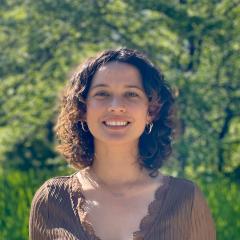
Hasibe Caballero-Gómez
UCLA, PhD, Environmental Health Sciences
Hasibe Caballero-Gómez is an environmental health scientist and community advocate. Driven by her lived experiences and a vision of equity, she combines research with grassroots engagement to create meaningful, inclusive solutions for environmental challenges.
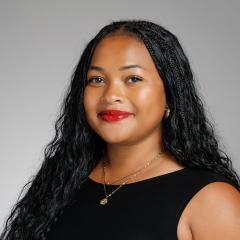
Maya Caine
Yale University, MEM, Industrial Ecology & Green Chemistry
Maya Caine is a slow fashion entrepreneur focused on designing life-affirming systems that prioritize longevity, circularity, and justice. With a background in corporate strategy and systems thinking, she has spent the past seven years building slow and circular fashion solutions that challenge the industry’s dependence on overproduction and waste.
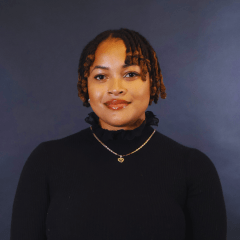
Mica Caine
MIT, Master of City Planning, Environmental Policy & Planning
Mica Caine is the co-founder of Helix, a circular fashion marketplace focused on keeping clothing, care, and stories in motion within local communities. A Central Ohio native, Mica’s work is deeply rooted in place and relationships, spanning circular economy, community-led climate resilience, and decentralized energy systems.

Lupe Franco
UC Davis, PhD, Geography
Lupe Franco explores how unhoused individuals experience and navigate extreme weather conditions, with a focus on the systemic barriers that exacerbate their vulnerability. Her work sits at the intersection of climate justice, environmental justice, and homelessness.

Mukta Kelkar
UC Santa Barbara, PhD, Environmental Science and Management
Mukta Kelkar is a marine ecologist who bridges foundational ecology with applied conservation and social science in order to inform marine conservation approaches for a changing climate.
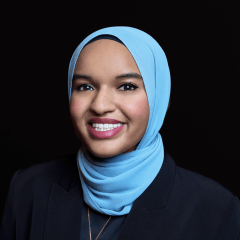
Malika Kounkourou
Harvard University, JD, Law
Malika Kounkourou serves as a managing editor of the Harvard Environmental Law Review and is a research assistant at the Harvard Environmental and Energy Law Program. Her interests lie at the intersection of alternative dispute resolution systems, corporate accountability, and climate justice, with a focus on extractive industry governance.

Maria Lopez Vazquez
Rhode Island School of Design, MLA, Landscape Architecture
Maria Lopez Vazquez is a multicultural landscape designer from the border region of Tijuana-San Diego (MX-US). She has a Bachelors of Landscape Architecture from UC Berkeley. By pursuing her Master's in Landscape Architecture at the Rhode Island School of Design, she hopes to inform her landscape design practice with sustainable efforts as an artist and maker.

Eric Medina-Can
UC Santa Cruz, MS, Coastal Science and Policy
Eric Medina studies how coastal wetland restoration can improve habitat, protect urban spaces, and increase access to green space. He is excited about the opportunities climate adaptation presents for envisioning futures that prioritize both the ecological systems California’s cities rely on and the daily quality of life for people.

Nargis Mirzaie
UMass Amherst, PhD, Environmental Conservation: Water, Wetlands, and Watersheds
Nargis Mirzaie studies the impacts of climate extremes—particularly droughts and floods—on communities and water systems. Her research focuses on understanding hydrological changes, improving drought assessment tools, and promoting equity in climate adaptation and water resource planning.

Cindy Nguyen
UC Berkeley, JD, Law
Cindy Nguyen is a proud first-generation, Vietnamese-American dedicated to building a more healthy, just, and equitable world for all. Motivated by her experiences observing environmental-health burdens in Vietnamese nail salons, Cindy hopes to use legal tools to both confront the systems driving environmental-health inequities and empower historically overburdened communities to build their own versions of a just future.

Timothy Onuh
UMass Amherst, PhD, Chemical Engineering
Timothy Onuh researches innovative approaches to improve the removal efficiency of nanoparticles (an emerging contaminant) from wastewater systems and promote sustainable water treatment. He strives to integrate his research with policy advocacy, with the overarching goal of practically translating science and engineering principles into socially and environmentally responsible policies.

Bryan Plankenhorn
University of Rhode Island, PhD, Biological Oceanography
Bryan Plankenhorn (Port Gamble S’Klallam) is an Indigenous scientist exploring harmful algal bloom drivers and reintroducing Indigenous narratives and knowledge into marine resource management. They are deeply committed to supporting Indigenous communities across the United States by amplifying Indigenous perspectives in scientific research and federal policy.

Sarah Sarfaty Epstein
UC Berkeley, MS, Energy and Resources
Sarah Sarfaty Epstein is interested in landscape-scale climate resilience decision making in California’s agricultural sector, particularly at the agriculture-energy-water nexus. Her current research uses geospatial analysis to create decision support tools at the groundwater basin level. Born and raised in the East Bay, she is proud to call California home.
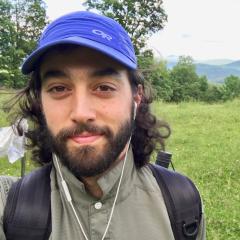
Karam Sheban
Yale University, PhD, Forestry, Agroforestry
Karam Sheban supports agroforestry adoption through targeted science that builds toward effective policy, viable economies, and cultural revitalization. He sees his work as part of a larger reimagining of our agricultural and forested landscapes for a more just and equitable world.

Ki’Amber Thompson
UC Santa Cruz, PhD, Sociology
Ki’Amber Thompson is an abolitionist environmental justice educator, healing justice practitioner, and multimedia artist. They are the Founder and Co-Executive Director of the Charles Roundtree Bloom Project. Their work bridges abolition, decolonial, and environmental justice movements toward imagining and creating more socially and environmentally just and sustainable worlds.

Sena Wazer
Yale University, MEM, People, Equity and the Environment and Climate Change Science and Solutions
Sena Wazer is a community organizer and advocate from Connecticut. Her work centers around community organizing as a mechanism for creating policy change, particularly at the state level.

Logan White
Cal Poly Humboldt, MS, Social Work
Based in rural Northern California and informed by his Choctaw heritage, Logan White works with tribal communities at the nexus of environmental stewardship and behavioral health to address the intergenerational trauma colonialism has left in its wake. He calls this approach “restoration therapy,” a practice that treats ecological restoration as both practical healing for the land and a living metaphor for strengthening individual and community wellness.

Cynthia Wilson
UC Berkeley, PhD, Environmental Science, Policy, & Management
A nutritionist by training, Cynthia Wilson (Diné) centers her research on interdisciplinary approaches to Indigenous environmental health, kinship mobility, and Diné foodways. Since 2016, she co-led community-based traditional foods program and ancestral lands advocacy at Bears Ears National Monument.